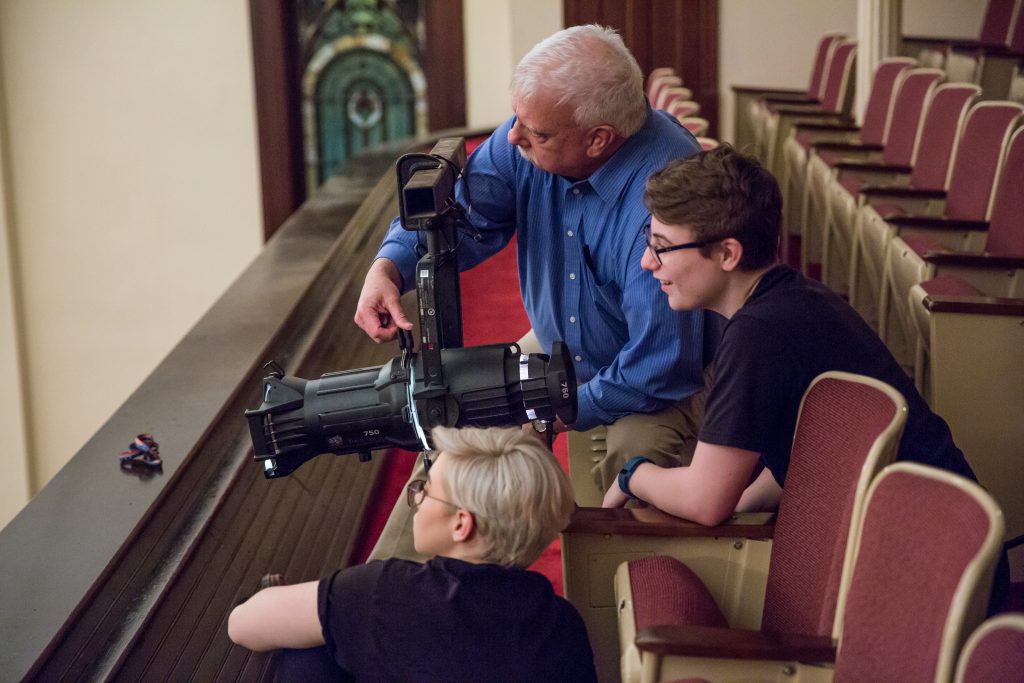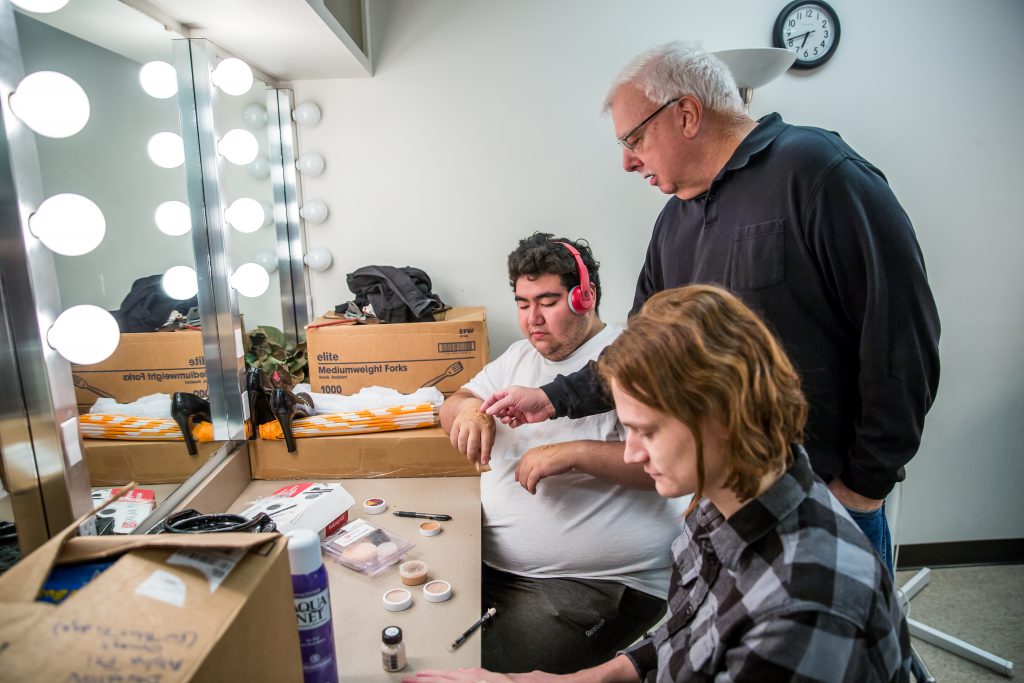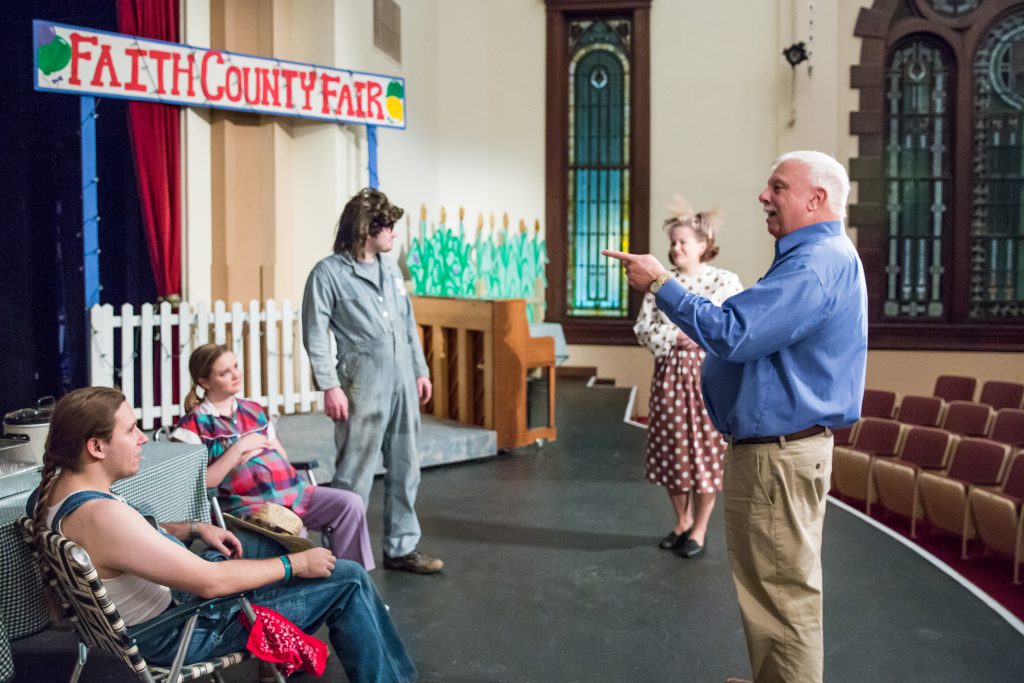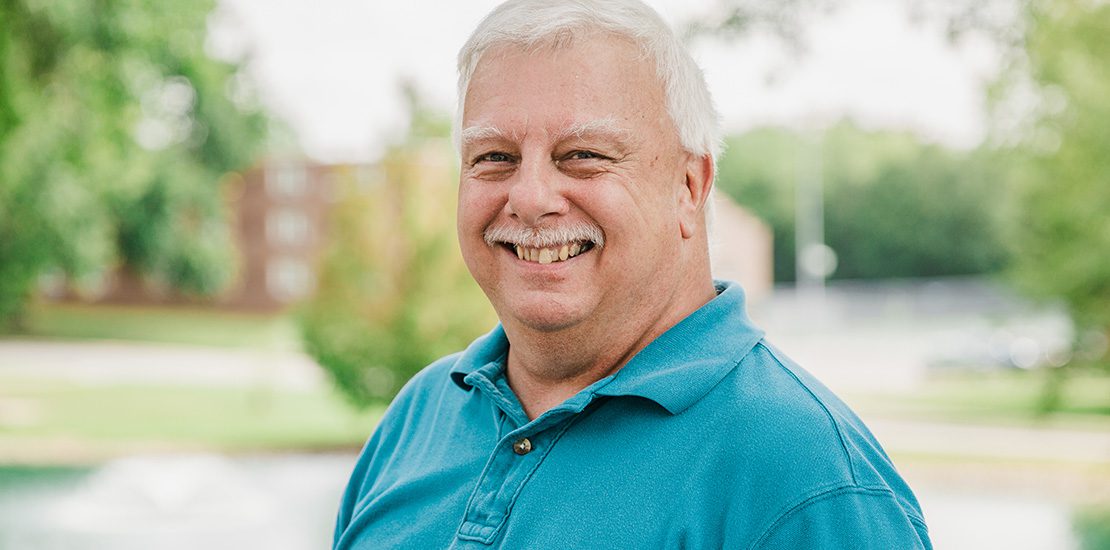Joe Potter
Assistant Professor of Theatre
Artistic Director
A Family Affair
I grew up in Independence, Missouri and I came about theatre and show business in an inherited way. My mother was a tap dancer and I still have a really nice picture of her in her tap outfit from way back when. We used to sit on Saturday and Sunday afternoons and watch old MGM Musicals. Back then there was maybe one independent station, and they would show those musicals to fill up time and I’d watch Fred Astaire and Ginger Rodgers and all those people with my mom who was interested in all that. So then I got very interested in it, not only the dance but the production values and the design.
Also when I was little guy, probably as tall as a classroom desk, my father worked for a community theatre at night and he would go after work and build scenery there. And I’d go and hang out with him. It was an outdoor theatre, and I can remember playing amongst the seats and the gravel, and also remember watching them rehearse. I also watched them paint scenery. So it was a natural progression as I was growing up, to finally get involved with theatre when I reached high school.
Interestingly enough, I actually took theatre as a supposedly easy credit my senior year. But first of all it wasn’t easy. And second of all, that was how I discovered that was who I was. So that’s how that all came together and I got a scholarship to Drury University, which started me on the road to education and theatre. While I was there, I worked summers at Starlight Theatre, a big outdoor theatre in Kansas City. Often times they’ll have community people involved in the chorus and all that, and so I worked four summers there. I later got married and moved to California with my wife, who was also involved in theatre, and we went to work in the movie and television industry.
My brother is also into theatre, he lives in New York and is a designer. He works for Broadway and has designed for all kinds of shows. My children are both in the industry now as well, as my son works in Hollywood and my daughter is in New York City acting. So I guess we Potters come by it naturally.
An Education in Show Business
In a way, working in Los Angeles was an education in itself. In California, I worked off a union call board, so every day you would call-in and they would send you some place for the next day. Sometimes the employment was longer, sometimes it was a day, sometimes it was a week, sometimes it was a year, you just never knew. I got a lot of experience in a lot of places. In fact the only major movie studios that I didn’t work on were the CBS Studio Lot, which is where they did a lot of sitcoms back then, and the Disney lot. But I worked a lot on Universal, MGM, 20th Century Fox and Burbank Studios (now Warner Brothers and Columbia Studios.) I spent the last two years of my five out there at Burbank Studios because I was going to grad school and needed a more permanent, regular position. I worked on all kinds of shows, including television specials; back in the 70’s and early 80’s, there was a show called The Midnight Special that came on at midnight on Saturday nights that was all the current rock and pop music. So I worked with a lot of folks like that. I also did a lot of concert and stadium work.
Probably being a sort of Sci-Fi nerd in some ways, ones of my biggest thrills was working on the first Start Trek movie. I’ve been on the Starship Enterprise, I’ve been on the bridge, I’ve stood on a transporter pad, knowing it was all fake stuff. Another big thrill was to get to work The Carol Burnett show; one particular time I had the job of building an upright piano out of balsa wood that was blown up on camera, so it was only really seen for about 5 seconds. That’s back in the days when Dick Van Dyke was on that show too. He recreated the singing in the rain number and so that was an 18-hour day that we worked. It was shot in the same studio that The Price is Right is shot in. I worked on a bunch of movies and a lot of popular television shows of the day like The Walton’s, Fantasy Island, and Charlie’s Angels. I used to be the guy that would get called to hang Paul Newman’s current racing trophy, because he had an office at Burbank Studios. I met Barbara Streisand, Peter Falk – you know I could name drop forever – but eventually you get to the point where you’re just two people at work doing a job.
In terms of what I did, it was pretty much all technical work, including props, lighting, and sound. Whatever the job called for. My very first TV show that I worked on was The Newly Wed Game and they said, be there at midnight, you’re going to be hanging lights. So we were these big, giant 10,000-watt lighting instruments up a ladder to light the television set for that. That’s what I was doing back in those days.
Eventually, after grad school, we decided we wanted to settle down and move back to the Midwest which is when I started to look into teaching.

Grad School and a Jack-of-all-Trades
So my original goal was to start out as a techie and then become a designer, but I sure did like that notoriety of being on stage, too. And so now, looking back, I would probably say I was more of a generalist than I was one or the other, sort of the jack-of-all-trades. I had a lot of people tell me ‘you’re more the producer/manager kind,’ but when I first started out, I wanted to get involved in the technical side of things. I wanted to eventually design sets and all that. I started to think about what I still liked about the industry and what I didn’t anymore, which changed even more when I went back to grad school.
I went to California State University of Los Angeles, where my wife was finishing up her degree. I liked the people and I knew it had really good credentials. Several of the people who taught there had reenergized the theatre in the L.A. area during the late 50’s and 60’s and so those kinds of ideas were in the front of my mind. These people were the ones inspiring these theatres to pop up everywhere. I liked the fact that even though it was a big school, the graduate school setting was like a family. I learned quite a bit from the technical guys there and quite a bit from the head of the department. He had actually survived the concentration camps as a young boy and had lost all his hair from the experience, and girls would always kiss his bald head on opening night leaving lipstick all over it. He was very inspiring in the sense of making theatre an art form but also making it a fun place to be creative and share. So I was working in the studios during the day and going to school at night. I spent my two years there and then started looking for a connection back to the Midwest with teaching. I thought if we’re going to move back, why not share what I’ve learned with students and hopefully create the next generation? So that was my next big goal, to become a teacher. And I never would’ve thought of that when I was a kid, but when I look back I was inspired by my high school drama teacher.
Teaching over the Decades
Back when I started in 1982 and it was still a single-sex institution at that point, but we shared some theatre majors with Westminster. It’s totally different than now. That particular decade, is totally different than the next decade and the next decade after that, because students change and culture changes with the decades. So I’ve often said that the way I taught in the 80’s would no longer work today, because the education process has changed completely. There’s less of the sit-and-get-lectured-at today. I found out that there’s the whole representation of economic and social backgrounds here. What I found is it doesn’t matter where you are or who you are, theatre people are theatre people. That goes for all of the arts people really.
I felt at home at William Woods right away. The first year or two took some getting used to because I had to show what to do and how to do it instead of just doing it by myself. So I had to learn, I’m going to tell them how to do it and then I’m going to let them do it. And so you turn them loose and sometimes you have to grin and bear it when they mess up and say what did we learn from that. I still teach that way. As the popular quote goes, ‘in order to succeed, you have to fail.’ And sometimes people had some big mistakes along the way but then you’d see that lightbulb come on, like they got the idea. I still see that and it makes me feel good. It really hasn’t changed in the sense of student learning, it’s just how we process and give the information to you. Back then I loved using a chalkboard, now it’s using PowerPoint and dry erase boards. So the teaching style changes but I’ve always been a bit unorthodox. You wouldn’t find it unusual to see me lie down in the middle of the floor or to sit on top of a student’s desk or just do things that are out of the ordinary. Sometimes I do it just to see if they’re paying attention. I also think it helps build a sense of connection. Students are still the same, sometimes you have to push them a little to get them to take a step but then they get it and you move on to the next step.

Theatre Classes at William Woods
Right now, I’m teaching Theatre History and that’s probably the most traditional class, in the sense of, I’m going to lecture today about Ancient Rome or the Renaissance and how theatre developed there. In the technical courses I teach stage craft and every student designs a set and learns how to read floorplans and do all that stuff. And because the mainstage is a co-curricular, every day students are learning all aspects of theatre and actually making that happen. I’m also teaching Acting 1 and the students are working with the Directing class at the same time, so those two classes come together, with the actors getting directed by the directing students which is very helpful in a lot of ways for both classes. I’m teaching makeup right now and in there its very simply learning how to create makeup that’s going to be effective. Or we also learn how to make mustaches and how to use a variety of makeup products and whether they’re good or bad for you. I also teach stage combat. Even at 63 years old, I’m still teaching students how to hand-to-hand fight and how to make it look real and also just enough about sword play to make them safely and effectively fight on stage with a sword. That class usually fills up almost immediately, I get a lot of non-majors in it which is okay. In every case, I try to put my whole heart into it and I always update them to make them relevant. When I first came here I also taught half speech and half theatre and I’m always happy to help out with speech classes.
Goals for the Theatre Program
My goal is real simple, I want the program to grow. We have sort of roller-coastered like a lot of programs do through the years and theatre can happen anywhere at any time, but when you have a lot of people and that amount of input it always makes it easier. So my goals are to producer quality theatre and produce quality students. Someone asked me over the summer, ‘what do you expect your student to take away from your program?’ And it’s a real simple thing, a love of the performing arts that they can then carry into the next stage of their life, be it as a professional in that area or as a bystander who goes to a lot of theatre. Or as somebody who creates their own community theatre, that sort of thing. That’s really what I want, because I want enough of those people out there so that whenever I decide it’s time for me to hang up the tap shoes and put away the grease paint, I know there’s a whole bunch of young people coming up behind me that still have that same kind of a drive and love of the arts. And if you think about it, what we teach in theatre, is very important no matter what your job title because you’re going to be asked to think creatively, you’re going to be asked to think critically, you’re going to be asked to produce something, you’re going to be asked to work in groups and work with people and that’s what we do on a regular basis. Theatre is an ensemble effort. So my goal basically is for people to love the art as much as I love the art. I hear from a lot of alumni and it seems to be working. They seem to be connected very actively or they’re still going to see things. So that’s really my goal, for it to grow and for people to love the art form.

Being Artistic Director
The Artistic Director is in charge of keeping the overall direction, the overall vision of what you’re creating and trying to make it cost-effective. As Artistic Director we always sit down with faculty and staff and decide what are we going to do for the next season, what kinds of shows are we interested in doing. Those are always picked in such a way that we are looking at the students who are there now and saying how can we pick something that will push them some more, so they’ll be learning, but that we can pull off and produce quality. We have to think about two big groups – what the students are interested in and what the community is interested in. This season is a good example of that, we’re doing two old favorites and two new pieces. Students then get a good healthy mix of all the genres of plays, and yet we’re trying to pick things that will sell to the public and that students will want to see. Sometimes it’s tough to balance what the public wants and what the students want. Like one time, I did Oklahoma thinking it would do great and it didn’t do very well. And we’ve had other ones where people said that was really weird but I really liked that. Artistic Direction is a tough job, and you’ll learn real fast what works and what doesn’t. I have worked on over 200 productions at William Woods.
Staying Involved in Theatre
I have taken workshops in areas I teach regularly like scene painting. I read plays, I read articles, I read a lot about theatre advocacy. I go to two major events every year, the Missouri State Thespians which is a big high school setting and I recruit there but I also learn what the high schools are thinking about and doing. And then I also go to one in the summertime which is the International version, so you’re going to see students from all the states and a few of the territories. And then I have discussions with my brother who’s designing the newest set. Over the years there’s been a group of artistic directors and chairs that meets from all over Missouri and talk about struggles with budget, or here’s what works for us and maybe it will work for you guys. But otherwise it’s just talking to colleagues and staying informed that way, through conversation.
Job Opportunities for Students
We spend time during their senior project/seminar discussing the possibilities and where they should go for these opportunities. There are three distinct career paths students may choose after graduation from The Woods. If they are graduating with a BA in Theatre, first we encourage them to go on to graduate school to gain more training in the area of their expertise such as performance or technical theatre. If they do not want to do that, some students jump right into the job market, auditioning for acting jobs, or getting hired as technicians with opportunities to eventually design productions.
Students graduating with a major in Speech and Theatre Education are encouraged to put their name out to the school districts and job search for openings as teachers. Our two most recent May graduates in this area were hired before the end of the summer.
Students can also branch out into other areas of television, movies, industrial films, theme park entertainment and community theatre.

